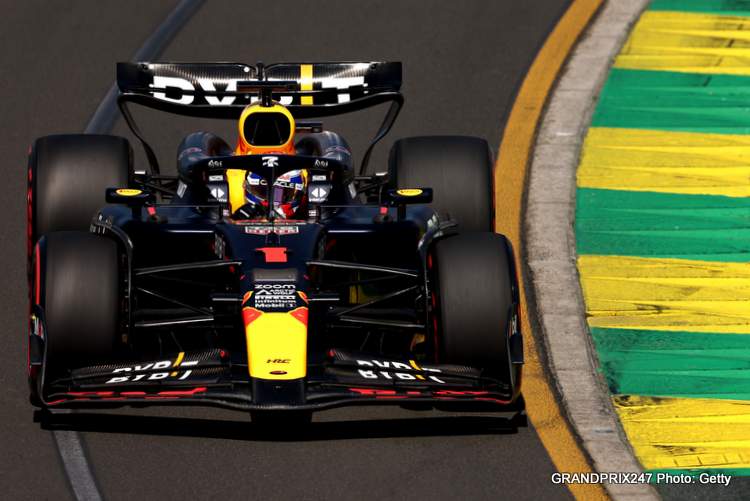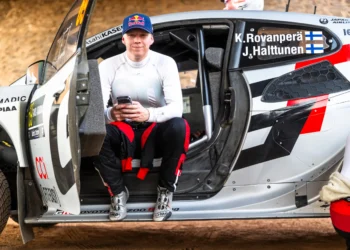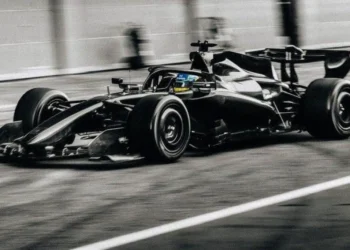MELBOURNE, AUSTRALIA – MARCH 22: Max Verstappen, from the Netherlands, driving the Oracle Red Bull Racing RB20 on the track during practice before the Australian Formula 1 Grand Prix at Albert Park Circuit on March 22, 2024 in Melbourne, Australia. (Photo by Robert Cianflone/Getty Images) // Getty Images / Red Bull Content Pool // SI202403220068 // Editorial use only //
This comes after the three-time Formula 1 world champion finished the first day of practice in the second fastest position. Verstappen was only edged out by Charles Leclerc’s Ferrari in FP2 at a crowded Albert Park today.
Leclerc finished four tenths of a second ahead of Verstappen when the session ended on the first day. Sergio Perez, in the other Red Bull, only managed P8 at the end of the first day of track action in Australia.
Reflecting on his Friday, Verstappen commented: “Unfortunately, it was a bit chaotic due to what happened in FP1. I went off track, damaging the floor and chassis. It took a bit longer to fix, so I lost around 20 minutes.
“However, I think the team made a quick recovery, and I was able to complete most of the program. I would have liked to do a few more laps in the long run, but that’s what happens when you lose 20 minutes.
“I think it was good. Ferrari seems to be fast, but we also have some things we can adjust on our side. Nothing too crazy or worrying, just some necessary tweaks to the car,” added Verstappen. He remains undefeated in this year’s qualifying and races.
As usual, Sergio Perez had a slower start compared to his teammate at Red Bull. As a result, the veteran Mexican only managed P8, eight tenths behind the leading time and half a second behind Max.
Perez commented on the challenging Friday: “Overall, it was a tough day. We have some work to do overnight. In the afternoon, Melbourne becomes quite difficult due to the low visibility caused by the low sun.
“However, I believe we are in a good position this season with the car, and we should be strong on Saturday. It is important to qualify in a good position. Degradation seems to be quite high in long races, so we need to analyze that and determine the best strategy for the weekend.
“Ferrari looks strong, especially on this circuit. They have been competitive in long races. It will be a challenge to beat them this weekend, as they are fast here. It will be interesting to see how we compare,” expressed Perez.
Red Bull has been dominant in the first two races of the season, even more so than last year. However, the higher downforce demands of Albert Park, compared to the Bahrain International Circuit with medium downforce (Round 1) and the fast Jeddah Corniche Circuit (Round 2), may pose a tougher test for the RB20.
However, the current hierarchy suggests that another one-two result is likely for Red Bull, which has shown a tendency to excel when it matters on Saturdays and Sundays. Expect a similar approach from the World Champions in Melbourne in the coming days.
© 2024
The future of football: what to expect in the coming years
Football is an exciting sport that captivates millions of fans around the world. Over the years, the sport has evolved and adapted to new trends and technologies. In this article, we will explore what we can expect from football in the coming years.
One of the main changes we can expect is the advancement of technology in sports. The use of VAR (Video Assistant Referee) is already a reality in many championships and is likely to become even more prevalent. In addition, artificial intelligence can also be used to analyze plays and assist coaches in decision-making.
Another trend that is gaining momentum is the concern for sustainability. Football is a sport that generates a large amount of waste, from the production of sports materials to the energy consumption in stadiums. Therefore, in the coming years, there is likely to be a greater investment in sustainable technologies, such as the use of solar energy in stadiums and the production of environmentally friendly sports materials.
Furthermore, there may be greater diversity in football. Currently, the sport is dominated by players from a few countries, but this may change in the coming years. With globalization and easy access to information, new talents are likely to emerge in countries that were not considered football powerhouses before.
Finally, the fan experience is also likely to transform. With the advancement of technology, stadiums may become increasingly interactive, offering fans a unique experience. In addition, game broadcasts may become even more immersive, allowing fans to follow matches from anywhere in the world.
In conclusion, football is constantly evolving and in the coming years we can expect significant changes in the sport. From the advancement of technology to the concern for sustainability, football will continue to enchant and surprise fans around the world. The future of football is promising and we can’t wait to see what awaits us.










